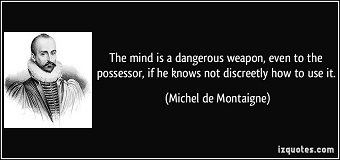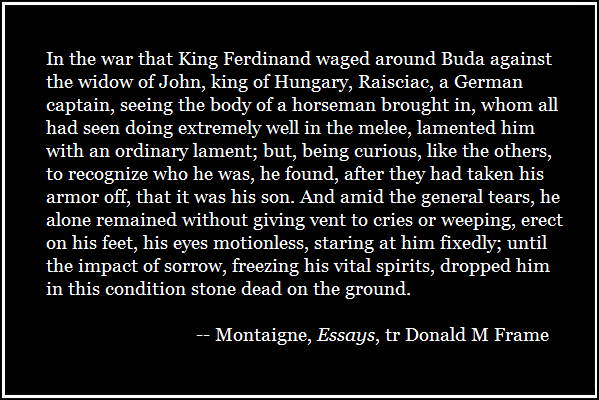[ by Charles Cameron — on gaming “living and moral forces” — with a whiff or two of Montaigne ]
.
**
Let’s start with Clausewitz, On War.
He says — and we’d be wise to pay attention — “most of the matters dealt with in this book are composed of equal parts of physical and of moral causes and effects.” Earlier in the paragraph, he’d said, “The effects of physical and psychological factors form an organic whole which, unlike a metal alloy, is inseparable..” — which puts the physical and the moral on equal footing. He then tilts the board decisively in favor of the “moral” factors —
One might say that the physical factors seem little more than the wooden hilt, while the moral factors are the precious metal, the real weapon, the finely-honed blade.
Furthermore, these “moral factors” are “intangible” — or as Michael Handel puts it:
In contrast to the physical forces, which are relatively easy to estimate, the equally important moral forces are more difficult to gauge.
**
Deputy Secretary of Defense Bob Work and Gen. Paul Selva, Revitalizing Wargaming is necessary to be prepared for future wars:
For example, faculty and students at the Naval War College integrated wargaming into their entire course of study, analyzing the then-novel concept of carrier task force operations, the role of submarines in scouting and raiding, and how to provide logistics support to fleet operations spread over the vast Pacific Ocean. Wargames in classrooms at Quantico helped the Marine Corps develop new concepts for amphibious warfare and conceive of new techniques for capturing advanced naval bases. Wargamers at the Army War College explored how to employ tanks and artillery on infantry-dominated battlefields and examined the logistical challenges of fighting a war far from American shores.
and:
Most importantly, players should be able to observe and live with the consequences of their actions (where possible, based on previous rigorous analysis) in the face of a thinking and reacting competitor, and so come to understand dynamic military competition from the perspective of opposing sides. Actions taken by the players on both sides must have tangible consequences that are determined — where possible — by the actual performance of weapons and sensors in the real world, backed by a rigorous adjudication process using the best available analysis and professional judgment.
**
In the first of those paragraphs, we have “carrier task force operations”, “the role of submarines”, “logistics support”, “fleet operations”, “amphibious warfare”, “advanced naval bases”, “tanks and artillery”, infantry-dominated battlefields”, and more “logistical challenges”.
Now admittedly, that’s pre-WWII wargaming — but no mention there of the impact of upcoming psychological forces such as the Nuremberg rallies, Hitler’s obsession with Wagner and Bayreuth, Leni Riefenstahl, Himmler’s occult interests, and so forth — not because they were known or in existence at the time, they weren’t, but because they constituted in the event precisely the sort of intangible morale boost / force multiplier that can tip a battlefield and slide a war, as per Clausewitz.
Nary a mention of psychology, moral, morale, espirt, spirituality, religion, let alone Dempsey’s “apocalyptic, end-of-days strategic vision” which we now face in IS.
And that second paragraph, dealing with the present and near future — the move to consider dynamic interaction is to be lauded, but once again we’rew in the realm of “weapons and sensors in the real world”. I’m led to the suspicion that current wargaming doesn’t know quite how to deal with “tangible consequences” that are not determined “by the actual performance of weapons and sensors” but by, ahem, passion.
**
**
If moral causes and effects are as potent as weapons, or even, as Clausewitz said, are themselves “the real weapon, the finely-honed blade”, games focused not on performances of weapons but on moral causes and effects — games that game passions — must surely have a significant role to play in revitalizing wargaming.




